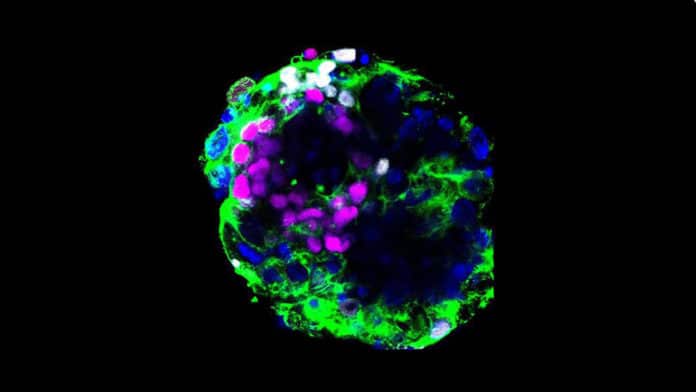It rapidly became clear that the virus has widespread effects upon many tissues and that thromboembolic events are the major cause of death. However, the consequences of infection for the unborn child are largely unaddressed.
In a new study, scientists from the University of Cambridge and the California Institute of Technology (Caltech) cultured human embryos through the stage they usually implant in the body of the mother to look at the activity – or ‘expression’ – of key genes in the embryo. They used a technology that allows embryos to develop in vitro beyond the implantation stage. The technology helps scientists analyze key stages of human embryo development up to 13 days after fertilization.
SARS-CoV-2 entry into a cell involves the interaction of its spike protein with the cell’s membrane-bound ACE2. Both the spike protein and ACE2 are then cleaved, allowing genetic material from the virus to enter the host cell.
Scientists observed that the patterns of expression of the genes ACE2, which provide genetic ode for the SARS-CoV-2 receptor, and TMPRSS2, also offers code for a molecule that split both the viral spike protein and the ACE2 receptor, allowing infection to occur. These genes were expressed during critical stages of the embryo’s development and in parts of the embryo that go on to develop into tissues that interact with the maternal blood supply for nutrient exchange.
Scientists noted that this could mean embryos are susceptible to COVID-19 if the mother gets sick, potentially affecting the chances of a successful pregnancy.
Professor Magdalena Zernicka-Goetz, who holds positions at both the University of Cambridge and Caltech, said: “Our work suggests that the human embryo could be susceptible to COVID-19 as early as the second week of pregnancy if the mother gets sick.”
“To know whether this really could happen, it now becomes essential to know whether the ACE2 and TMPRSS2 proteins are made and become correctly positioned at cell surfaces. If these next steps are also taking place, it is possible that the virus could be transmitted from the mother and infect the embryo’s cells.”
Professor David Glover, also from Cambridge and Caltech, added: “Genes encoding proteins that make cells susceptible to infection by this novel coronavirus become expressed very early on in the embryo’s development. This is an important stage when the embryo attaches to the mother’s womb and undertakes a major remodeling of all of its tissues and, for the first time, starts to grow. COVID-19 could affect the ability of the embryo to properly implant into the womb or could have implications for future fetal health.”
However, scientists think that there is a need for further study using stem cell models and in non-human primates to better understand the risk. However, they say their findings emphasize the importance of women planning for a family to try to reduce their risk of infection.
Bailey Weatherbee, a Ph.D. student at the University of Cambridge, said, “We don’t want women to be unduly worried by these findings, but they do reinforce the importance of doing everything they can to minimize their risk of infection.”
Journal Reference:
- Weatherbee, BAT, et al. Expression of SARS-CoV-2 receptor ACE2 and the protease TMPRSS2 suggests susceptibility of the human embryo in the first trimester. Open Biology; 5 Aug 2020; DOI: 10.1098/rsob.200162
